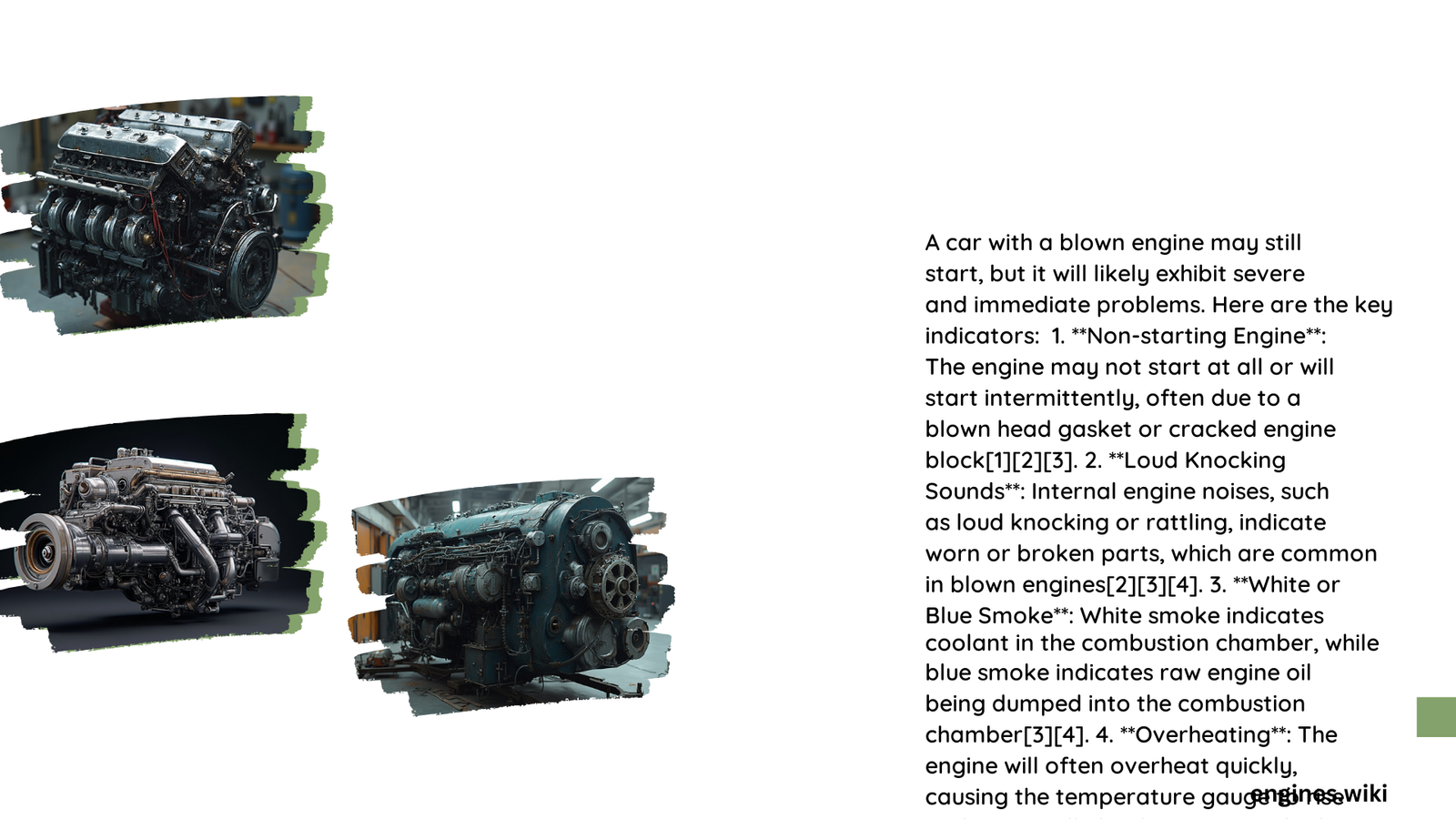A blown engine is a severe mechanical failure that can render a vehicle inoperable. This article explores the question: will a car start if the engine is blown? We’ll examine the signs of a blown engine, its effects on starting, and what steps to take if you suspect engine damage.
What Are the Signs of a Blown Engine?
A blown engine typically exhibits several telltale signs:
- Loud knocking or banging sounds
- Excessive smoke from the exhaust
- Loss of power
- Engine misfires
- Oil or coolant leaks
- Check engine light illumination
Can a Car Start with a Blown Engine?

In most cases, a car with a blown engine will not start. However, the extent of damage determines whether the engine will turn over:
- Severe Damage: If there’s catastrophic internal damage, the engine may not crank at all.
- Partial Damage: With less severe damage, the engine might turn over but fail to start or run properly.
- Intermittent Issues: In some cases, the car may start but exhibit significant problems during operation.
What Happens When You Try to Start a Car with a Blown Engine?
When attempting to start a car with a blown engine, you may experience:
- No cranking
- Cranking without starting
- Starting with immediate stalling
- Excessive vibration or shaking
- Unusual noises (knocking, ticking, or rattling)
How Does Engine Damage Affect Starting Components?
Engine damage can impact various starting components:
| Component | Effect of Engine Damage |
|---|---|
| Starter motor | May struggle to turn over a seized engine |
| Battery | Can drain quickly from repeated start attempts |
| Alternator | May fail due to increased strain |
| Fuel system | Can be contaminated by oil or coolant |
What Are the Common Causes of a Blown Engine?
Several factors can lead to a blown engine:
- Overheating
- Lack of oil or lubrication
- Timing belt or chain failure
- Hydrolock (water entering cylinders)
- Detonation or pre-ignition
- Manufacturing defects
How Can You Diagnose a Blown Engine?
To diagnose a blown engine:
- Listen for unusual noises
- Check for excessive exhaust smoke
- Perform a compression test
- Inspect for oil or coolant leaks
- Use an OBD-II scanner for error codes
- Conduct a visual inspection of engine components
What Should You Do if You Suspect a Blown Engine?
If you suspect your engine is blown:
- Stop driving immediately
- Have the vehicle towed to a reputable mechanic
- Get a professional diagnosis
- Weigh repair options against vehicle value
- Consider engine replacement or vehicle replacement
Can a Blown Engine Be Repaired?
The repairability of a blown engine depends on the extent of damage:
- Minor Damage: May be repairable with component replacement
- Moderate Damage: Might require a partial engine rebuild
- Severe Damage: Often necessitates a complete engine replacement
What Are the Costs Associated with a Blown Engine?
Costs for addressing a blown engine vary widely:
- Engine rebuild: $2,500 – $4,500
- Used engine replacement: $2,000 – $5,000
- New engine replacement: $4,000 – $8,000+
Note: These are estimates and can vary based on vehicle make, model, and labor costs.
How Can You Prevent Engine Failure?
To prevent engine failure:
- Follow regular maintenance schedules
- Check and change oil as recommended
- Monitor coolant levels and quality
- Address warning lights promptly
- Avoid overloading the engine
- Use the correct grade of fuel
Conclusion
A car with a blown engine will typically not start or run properly. Recognizing the signs of engine failure and taking prompt action can prevent further damage and help you make informed decisions about repairs or replacement. Regular maintenance remains the best defense against catastrophic engine failure.
References:
1. How To Tell If Your Engine Is Blown – YouTube
2. How do you tell if you have blown your engine? – Maxima Forums
3. 5 Signs of a Blown Engine You Should Know About – HeyRV
